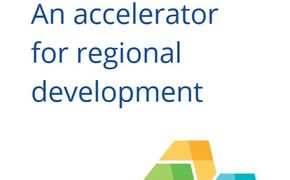On 15 March 2021, the Policy Learning Platform hosted a webinar on the topic of fostering the circular transformation of businesses, organised jointly with ACR+ (Association of Cities and Regions for sustainable Resource management).
The webinar presented some approaches on how regional and local authorities can contribute to promote and foster the circular transition of the economy and which types of measures are used to foster the circular transition of businesses in general and SMEs in particular:
- Soft incentives: awards, business competition
- Market recognition: certificates
- Financial incentives: grants, funds
The webinar presented policies and highlighted good practices from European, regional and local stakeholders, involving the following organisations: EIT Climate KIC, Waste Agency of Catalonia (Spain), Municipality of Kristiansand (Norway) and Zero Waste Scotland.
You can watch the recording and access the presentations below.
Webinar recording
Webinar agenda
Moderation and concept by: Luc Schmerber and Mart Veliste, Thematic Experts of SME competitiveness.
Navigate to the discussion topics of interest in the webinar agenda overview below.
Introduction to the topic and Policy Learning Platform services by Luc Schmerber.
00:16:07 Short introduction to ACR+ by Iain Gulland.
00:20:15 Keynote speech on EIT Climate-KIC and their Regional Innovation Scheme by Annalisa Spalazzi
00:33:45 Q&A: Are your services accessible to everyone or do you need to be involved in any of the regional innovation schemes?
00:35:47 Q&A: Do you work mostly on a national level with the regions or do you directly work with cities as well?
00:36:27 Q&A: How do you make sure that funding gets where it needs to go?
00:38:34 Presentation on the Catalonia Ecodesign award 2021 by Alfred Vara of the Waste Agency of Catalonia, partner in the SUBTRACT and ECOSWASTE 4 FOOD projects, Member of ACR+
00:55:08 Q&A: Did you work directly with the municipality and can this methodology be shared with other cities and regions so that the award could be launched elsewhere? And in order to launch such award, is the city required to have a circular economy action plan or strategy?
00:57:49 Q&A: Do you follow-up on the winners of the award to see their development?
00:59:25 Q&A: Do you also collaborate with Chambres of Commerces and industry?
01:05:05 Presentation on the Eco-lighthouse in Kristiansand in Norway by Øyvind Lyngen Laderud from the municipality of Kristiansand, lead partner of the GRESS project.
01:25:15 Q&A: In the certification process, is transparency taken into account such as information flows and power dynamics?
01:26:26 Q&A: Concerning the survey you did in your project, you mapped the obstacles that SMEs have. One of the obstacles is insufficient demand, could you explain this in more detail?
01:28:33 Presentation on the Circular Economy Investment Fund in Scotland by Iain Gulland from Zero Waste Scotland.
01:45:41 Q&A: Do you have other kind of financial incentives besides the investment funds or schemes related to circular economy?
01:51:29 Q&A: Systems change so that outcomes cannot be predicted, how does a grant or project based funding help to build e.g. an innovation ecosystem?
Panel discussion
01:54:04 Q&A: For less experienced participants, where do you recommend they start?
Key learnings
- Fostering the circular transformation of businesses requires an approach to whole ecosystems and bold moves towards circular economy. Such changes require a strong involvement and collaboration among stakeholders from policy, research, industry and civil society.
- On all levels there is a need to create circular communities, foster concrete circular developments and design new policies.
- Although the circular transition is on its way, business practices are not evolving as fast as one might hope, especially in terms of purchase practices, so that the market for green and sustainable products is often still insufficient for green companies to thrive.
- The public sector must play an important role in improving green public procurement, increase awareness among consumers and in businesses value-chain, as well as applying legislative, regulatory changes.









